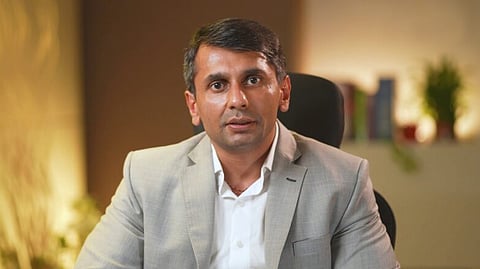Abhinandan Lodha floats ‘plots-only’ realty model
In the old days, especially in the smaller cities and towns, a ‘developer’ meant the chap who had the pluck to convert some agricultural land to ‘residential use’. He would then divide it up, provide water and electricity connections and sell plots to families to build their own houses.
What came up was a bit of a mess, but that’s how residential communities flourished. Over time, the definition of a ‘developer’ changed. By building row houses, or flats in multistorey buildings, the ‘developer’ added more value and increased his profit margin. For a buyer, it was a neater home without the hassle of putting brick and mortar together.
Now meet someone who has gone on reverse gear, moving from developing buildings and flats to selling plots in residential layouts. Abhinandan Lodha, a young 42-year old entrepreneur, son of the famous builder-politician Mangal Prabhat Lodha, has extricated himself from the shadows of his father and brother, Abhishek Lodha, to build scale with ‘plots-only’ realty projects.
Family break-up
I first met the young Abhinandan over a decade ago, when the Lodha Group had acquired Mumbai’s Shrinivas Mills and had launched the now famous ‘World One’ tower in Parel. It was a chance meeting at the office of a senior HDFC Realty officer. The Lodha scion was then negotiating a crucial Rs 500 crore loan for the Shrinivas project.
“We couldn’t go ahead without the HDFC loan. Though it was sanctioned by the realty team, HDFC chairman Deepak Parekh said ‘no’. It was the post-Lehman Brothers period of tight finance, and though I tried my best, Deepak Parekh refused,” recounted Abhinandan in a recent interview.
For three days the young realtor sat outside Mr Parekh’s Churchgate office. Abhinandan Lodha recounted his experience: “By the second day, the chairman asked me: You are still here? I said – Yes! Where will I go? I need the loan, sir. Deepak Parekh nodded and went inside his office, but then again found me where he left me when he was leaving in the evening. This went on. By the end of the third day, the chairman relented. He called his team and told them to draw up the papers!”
In the early days when the Lodha Group, later rechristened Macrotech Developers, grew at a heady pace, the younger Lodha remained in the background leaving his brother Abhishek Lodha to be the front face of the company. However, he cut his teeth early negotiating a record FDI deal of USD 410 million with Deutsche Bank when he was just 25. A few years later he drove the Rs 5,700-core land purchase of the Wadala container terminal that today is a sprawling 30-acre gated community called ‘New Cuffe Parade’.
In-charge of sales, marketing and finance, Abhinandan seemed to be doing well. So why did he split from the family company? “I did not want to be someone’s shadow,” he said. To the question, whether father Mangal Prabhat Lodha mediated to set things right with his brother Abhishek Lodha, Abhinandan was diffident. He said the father was occupied with politics as an MLA and a major BJP functionary, and chose to stay away from the snarl.
Was the separation bitter? “Let’s say the separation was non-consensual; but it is not litigative either,” responded Abhinandan.
New realty model
It was quite a struggle differentiating himself from the Lodha group and starting from scratch. He used the rather pompous title ‘House of Abhinandan Lodha’ or HoABL. He initially set up Lodha Ventures to incubate creative tech start-ups and also launched a private equity firm ‘Capital Tomorrow’. But after all his first calling was that of a realtor. It all started with a fluke joint venture with his legal attorney, Bergis Desai, a senior partner in the solicitors firm, J Sagar Associates. A 100-acre property in Dapoli, in Maharashtra’s coastal Konkan belt was acquired and developed in 2021 as a getaway resort called ‘Isle of Bliss’. “With focused marketing, the majority of the plots – ranging from 450 to 20,000 sq ft – were picked up in 3 weeks.
The success of the Dapoli experiment spurred on investments in land-buying and the sale of developed plots in a string of locations – two projects in Goa, and Sol-de-Alibaug just off the Mumbai coast. HoABL also launched two large plotted developments in Ayodhya covering 75 acres cashing in on the run for land after the construction of the Ram Mandir.
Lodha says he will be investing Rs 1,800 crore over fiscal 2024-25 with about Rs 550 crore earmarked for construction and infrastructure development and the rest committed to buying land. He intends to target highway corridors, and resort locations to ensure quick appreciation. The model is workable as the upfront investment is low compared to full construction projects, while the turnaround time is quick – ranging from 9 to 30 months. If sales are robust, there is a constant cash flow for quick expansion.
On the other hand, a linear business plan based on the sale of plots alone has obvious risks. It is entirely dependent on secondary demand, and the company could face serious losses if there are changes in the development plan of a region. Abhinandan Lodha is modernizing an old product for the realty market, and it will be interesting to see how far it will go.

